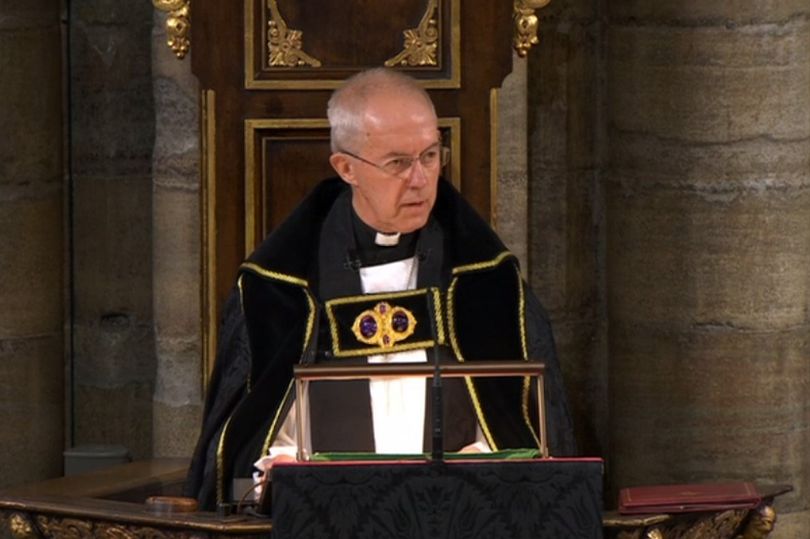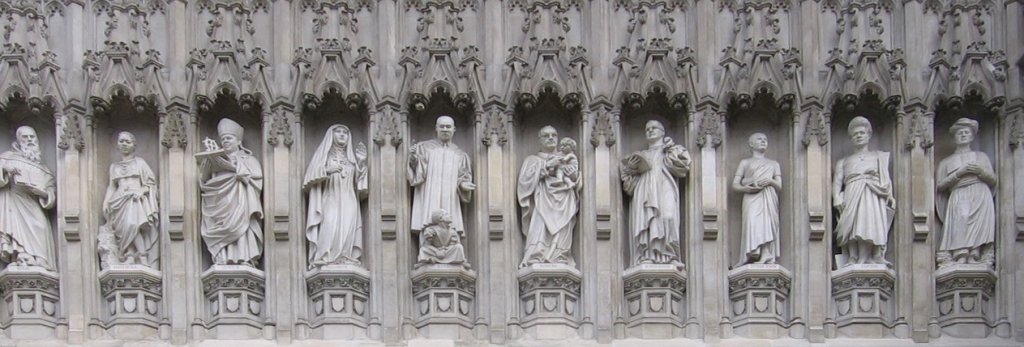
I can understand the feelings of those who struggled with aspects of yesterday’s funeral of Queen Elizabeth II.
However much respect and gratitude there is towards the Queen, the fusion of militarism, opulence and imperial power alongside Christian worship should create dissonance and provoke questions. The medium cannot be separated from the message.
It’s a struggle I have every time I am in Westminster Abbey. It is a church dedicated to the glory of God, yet it also feels like a temple to British imperialism.
For those who live in countries saturated in wealth, power and Christian religion, it’s a dissonance we cannot avoid. We should always be asking ‘What would the man in the sandals make of it?’
Conviction
This is why, amid the pomp and precision, Justin Welby’s sermon was so vital. In under 6 minutes, he shared a counter-cultural message about the value and priority of life with clarity and conviction.
Welby had some job on his hands. He was speaking to over 5 billion people – over 60% of the world’s population. Never has a sermon had this kind of profile and reach.
And he went for it. He did not couch his message in bland platitudes about Christian values. He avoided what he has described as the ‘moral claptrap’ which so often warps public discussions about faith.
Also, his brevity created clarity: a great example to those who preach. In a lifetime of church-going, I have never felt a sermon was too short.
Counter-cultural
But best of all, Welby shared a radical and deeply counter-cultural message about true value.
The pattern for many leaders is to be exalted in life and forgotten after death. The pattern for all who serve God – famous or obscure, respected or ignored – is that death is the door to glory.
Service and humility before God is not just a nice way to live; it is the route to true greatness:
People of loving service are rare in any walk of life. Leaders of loving service are still rarer. But in all cases those who serve will be loved and remembered when those who cling to power and privileges are long forgotten.
This truth is ultimately embodied by the life and death of the person at the heart of the Christian faith:
Jesus – who does not tell his disciples how to follow, but who to follow – said: “I am the way, the truth and the life”.
Ultimate sacrifice
I will always feel ambivalent about many of the statues and monuments which cover Westminster Abbey.
But there are a row of statues above the Great West door which remember 20th century martyrs who died because of their faith in Christ. They include Martin Luther King, Oscar Romero and Dietrich Bonhoeffer and seven others from across the world.

All of these people made the ultimate sacrifice because, even in the face of threats and oppression, they truly believed what Welby summarised so succinctly yesterday:
Service in life, hope in death.
John this is a truly brilliant piece of writing. I agree with every word and was tingling with gratitude and admiration for Justin Welby. He undoubtedly is a true and humble servant of God. The cross of nails that he received from Coventry Cathedral is a sure sign of his humility. Standing for Peace and Reconciliation the cross symbolises the ultimate sacrifice on the cross. I am proud to have been a friend of Justin and Caroline Welby’s along with my husband Bishop Colin Bennetts. I am equally proud to know you,John. Wr must all keep loving as the man in sandals taught us to and not be seduced by what we know He would have shunned more in sadness than in scorn. God bless your considerable
Ministry, John, and Nicky’s too.
LikeLiked by 1 person
Wow – thanks Veronica – that’s very generous of you. Thanks for reading and commenting. It is especially lovely coming from someone who knows Justin Welby personally. I hope that in amongst all the challenges and strains of his job that he feels encouraged by the response to his sermon. God bless you and hope to see you soon x
LikeLike
I think your reflections are really insightful, balanced and nuanced. Like you I thought some of the Christlike counter-cultural points Justin Welby made were of critical importance. But friends of mine who are not Christians – and are not so attuned the Christian message as we are – were not able to ‘hear’ what was said because of what they ‘saw’. They didn’t see the statues above the Great West door which commemorate 20th century martyrs, like Martin Luther King, Oscar Romero and Dietrich Bonhoeffer, who died because of their Christlike counter-cultural commitment to justice and peace. Rather they saw a spectacular celebration of powerful, imperial Christian triumphalism that prevented them from hearing the humble ‘message’ of Jesus, the radical prophetic figure who refused to be king. (John 6:15)
LikeLike
Thanks Dave. In amongst the intensity of the media coverage, we need to hear sensible voices which reflect back how others see things. Thanks for highlighting what many people ‘see’ which dominates whatever is ‘said’. Cultural symbolism is so vital and perhaps the Christian imagery/words and rituals which are so obvious and significant to some, are drowned out by a pageantry and militarism which reeks of empire.
LikeLike
Like you, I was very impressed with Archbishop Welby’s sermon. That he noted the first thing the Queen did was to go to the altar and pray for God’s guidance.
And to speak so directly to all the assembled leaders for them to reflect on why and how they lead! Very clever.
Jon
LikeLike
thanks Jon
LikeLike
It is debatable whether the Archbishop’s sermon had the greatest ever world wide reach. What about the Sermon on the Mount? However there can be little doubt that the sermon at the Queen’s funeral was heard live by the largest “congregation” in history.
Dave Andrews writes about how some of his friends were so put off by the medium that they were unable to hear the message. The opposite will also be true. Many will have tuned because of the exceptional circumstances, pomp and ceremony etc. and heard a sermon which will have made a big and positive impact. What else could Archbishop Justin possibly have done in the circumstances?
I am one who thinks that the sermon was great and am grateful that, as Jon says, “he went for it”. I wondered how much he was influenced by the Queen’s increasing boldness in speaking about her faith in her Christmas broadcasts. He used exactly the same quotation from “O little town of Bethlehem” that HM used in 2011.
To adapt Hebrews 11. 4., Queen Elizabeth “by faith still speaks, even though she is dead”. Thank God for her.
Henry Whyte
LikeLike
Hi Henry – fair point! I was meaning ‘immediate reach’ rather than subsequent reach.
I think your counter-point to Dave’s is valid. Dave has spent a lifetime working with very marginalised groups so will always speak with and influenced by that perspective.
And its great we have an ABC who ‘goes for it’! Thank God for the witness of people who bare a burden of public scrutiny which is more than most of us can possibly imagine.
thanks Henry for reading and your thoughtful comments.
LikeLike